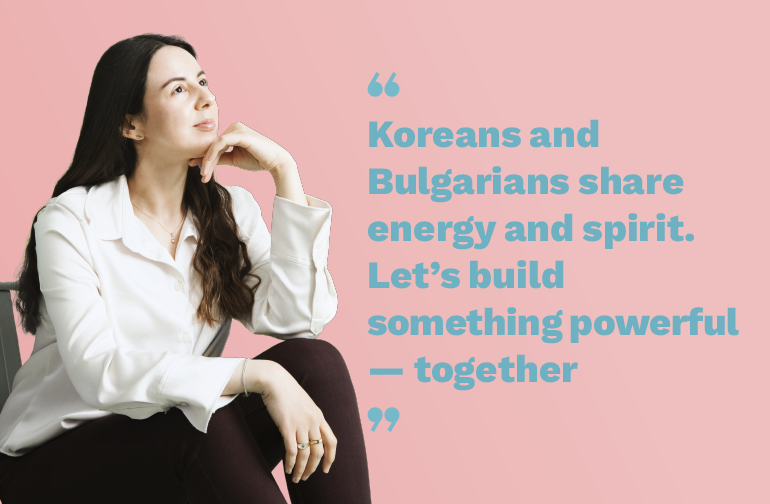
Latest News
- Hyundai E&C Becomes Key Player in the Nuclear Decommissioning Market
- Hyundai E&C Accelerates Global Nuclear Expansion into the U.S. Nuclear Market
- Hyundai E&C Shifts into High Gear to Enter Nordic Large-Scale Nuclear Market
- Hyundai E&C Strengthens Korea-Japan Cooperation in Energy Transition and New Growth Businesses
- Hyundai E&C Signals Green Light for Large-Scale Nuclear Power Plant Business in Europe
Key Players: Hyundai E&C Overseas Expansion
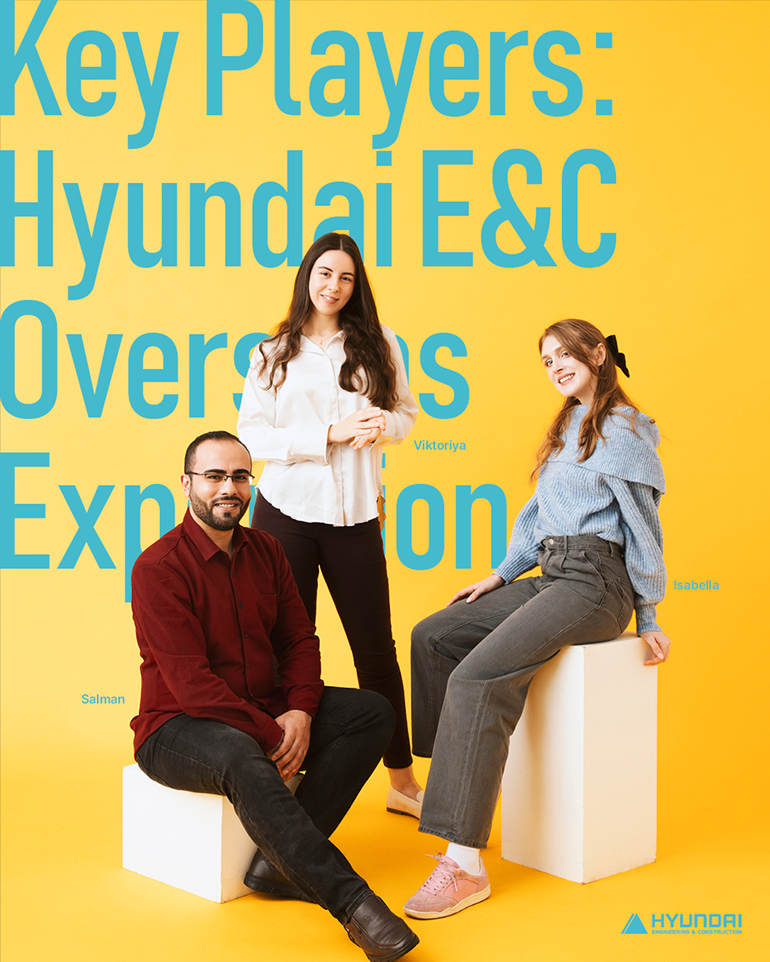
Hyundai E&C, the first to break into the global construction market, has completed over 880 projects across 62 countries! As the global market becomes more crucial than ever, Hyundai E&C is driving the future with global talents from diverse cultures and professional backgrounds. Meet the three trailblazing global talents at the forefront of this transformation, making powerful waves in the company.
NewEnergy Innovation Strategy Team
Manager Isabella
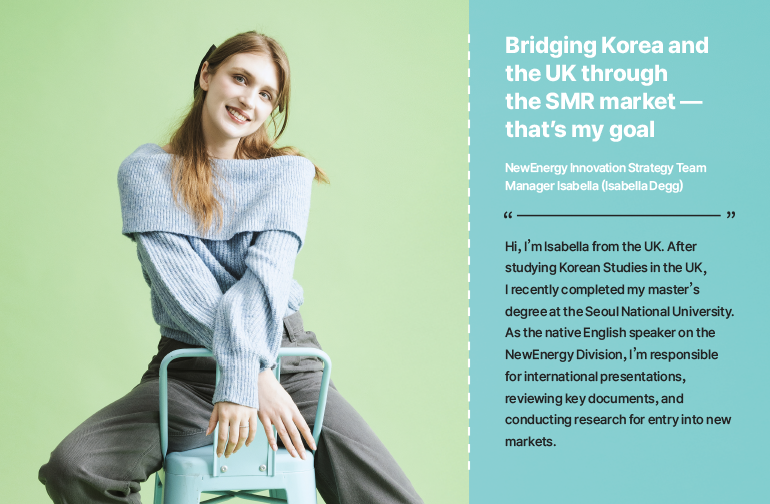
Q. Why did you choose to work at Hyundai E&C instead of a company in the UK?
Honestly, I never imagined working in Korea. After finishing my undergrad, I received a job offer from a top European bank, but was unexpectedly selected for the GKS(Global Korea Scholarship) program which brought me to Korea which gradually became my second home. I wanted to bring positive change here while also making an impact on my home country. Hyundai E&C’s global network and NewEnergy division caught my eye. NewEnergy requires global cooperation and sustainability—values that align with my experiences in multicultural environments, which I believe will help foster communication and collaboration in this field.
Q. As a British person living in Korea, have you noticed any cultural similarities?
Absolutely! At first, everything seems different—language, appearance, culture, etc. But I soon realized how much our values align. Both cultures emphasize family, friendship, and caring for others. The concept of ‘nunchi’—reading the room—felt familiar, as in the UK, we also communicate indirectly and rely on non-verbal cues. It’s clear that both cultures value respect and consideration.
Q. How have you personally changed since joining Hyundai E&C?
I’ve always been interested in global affairs and stay up to date with international news. But since joining Hyundai E&C, I’ve started seeing the world differently. What used to be just headlines now feel directly connected to our business. Every international development could represent a new market or influence the construction industry. It’s fascinating to trace the links between international relations and industry, and I feel like I’m growing as I gain a deeper understanding of this global landscape.
Q. What’s the biggest difference you see between Korean and British construction industries?
In the UK, administrative procedures tend to be more complex, which often slows down construction. Additionally, there is a focus on protecting historical architecture that can be hundreds of years old which changes how the final landscape will appear. The UK industry is more domestically focused, with relatively smaller-scale projects. In contrast, Korea—especially Hyundai E&C—is driving major notional infrastructure projects and actively expanding into global markets. I’ve seen firsthand how involved Hyundai E&C is in large-scale projects in regions like Europe and North America.
Q. Hyundai E&C is currently exploring opportunities in the UK’s SMR(Small Modular Reactor) market. What role would you like to play?
Hyundai E&C’s vast experience in global projects and its reputation for delivering projects on time and on budget can offer strong solutions to the challenges faced by previous nuclear projects in the UK.
I would love to contribute to this project and help promote next-generation energy solutions like SMRs to the world. Ultimately, I want to be part of building a more sustainable future—and that’s exactly why I’m here.
.png)
Infrastructure International Estimation Team 1
Manager Salman
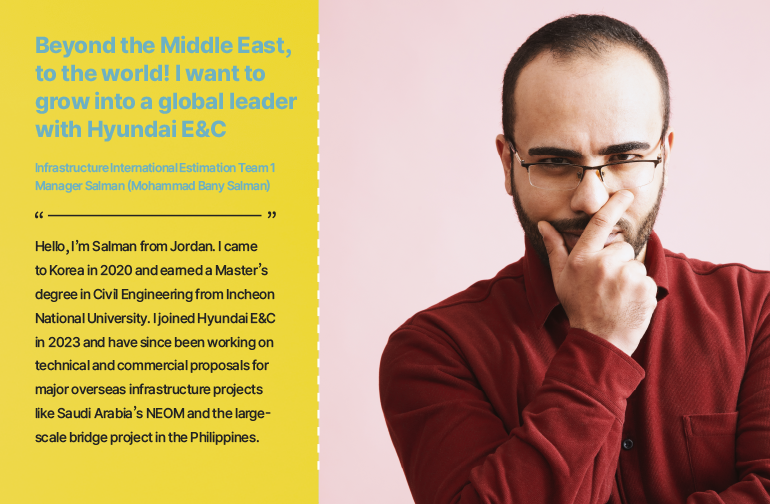
Q. What was your impression of Hyundai E&C before joining the company?
I was already familiar with Hyundai E&C's work in the Middle East, including Jordan as the company had successfully completed large-scale projects like ports, highways, and wastewater treatment plants in the region. Their ability to maintain consistent quality while adapting to diverse local environments and regulations really impressed me. That level of global capability and professionalism was one of the biggest reasons I applied to Hyundai E&C.
Q. Now that you’re in your second year, what’s your take on Korean work culture?
I’m constantly impressed by the responsibility and dedication of my Korean colleagues. I’ve learned so much from the team-oriented culture here. The structured decision-making process and the use of indirect communication to maintain flexibility really stood out to me. It was a bit unfamiliar at first—especially since my home culture tends to be more direct—but it’s helped me grow into a more effective communicator in a global environment.
Q. Any memorable experiences or impressions from living in Korea?
Living in Korea has been full of cultural discoveries—and weather surprises! Coming from Jordan’s mild climate, Korea’s scorching, humid summers and freezing, snowy winters were a big adjustment. Winter was tough at first, but now I’ve come to enjoy the beauty of all four seasons (laughs).
Culturally, I’ve seen strong similarities too. Jordan’s warm hospitality toward guests really mirrors Korean traditions. Talking about these shared values with my Korean colleagues has helped build mutual understanding and a friendlier, more connected workplace.
Q. What do you think is the biggest difference between the construction industries in Korea and Jordan?
One of the most noticeable differences is the level of digital technology being used. In Korea, advanced tools like BIM(Building Information Modeling) are widely adopted to minimize errors and improve overall project efficiency. The emphasis on meticulous planning and scheduling ensures that projects move quickly while maintaining high quality. Experiencing this firsthand has shown me how much technology can enhance both efficiency and accuracy in the construction field.
Q. What are your future goals and plans?
One of my main goals is to keep building global experience by working with experts from different cultural backgrounds. I’m currently expanding my skills in areas like quality control, risk management, and advanced construction technologies through international projects at Hyundai E&C. In the long term, I hope to grow into a leader who can drive global collaboration. I believe the experience I’m gaining in Korea—where precision and efficiency are key—is laying a strong foundation for the next step in my career.
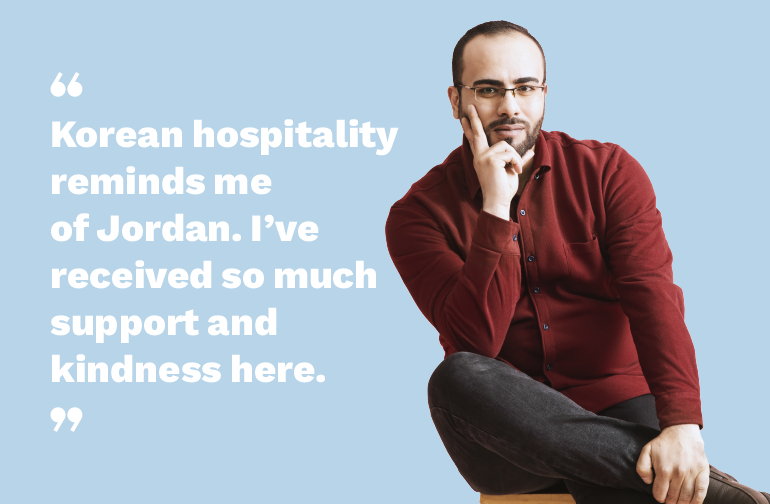
Nuclear Execution Team
Manager Viktoriya
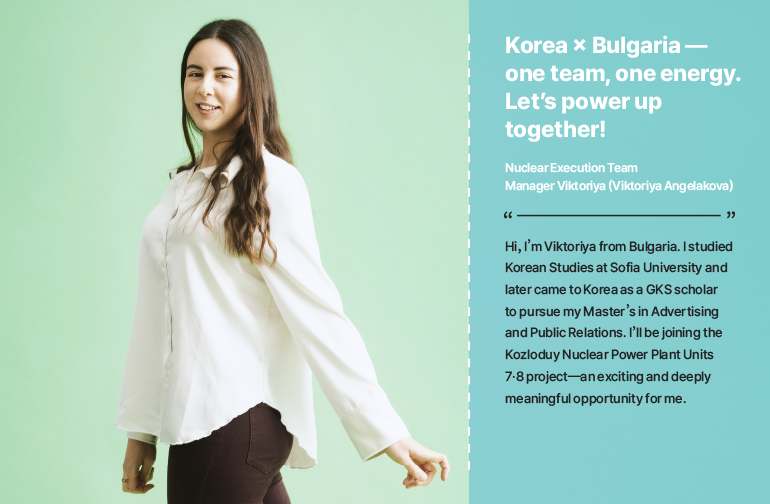
Q. How do you feel about joining the nuclear project* in your home country with Hyundai E&C?
Korea is known for its cutting-edge nuclear technology and exceptional project management. I’m confident that this expertise will be a great asset to Bulgaria, especially as we launch such a major new project.
As a Bulgarian, I feel incredibly proud to be part of this effort—both personally and professionally. I hope this project becomes a platform for Korea and Bulgaria to share knowledge, grow together, and strengthen their economic and diplomatic ties.
*Kozloduy Nuclear Power Plant Units 7·8: A mega-scale project to build two new reactors with completion expected in 2035.
Q. What has stood out to you while working with Korean colleagues?
I’m impressed by how responsible and systematic my Korean teammates are. There’s a strong culture of mutual respect, which makes collaboration smooth and productive. To adapt quickly, I’ve made an effort to communicate often and learn Korean business customs—like how to use titles, report to supervisors, and participate in meetings. What I appreciate most is how understanding my colleagues have been. Even if I don’t speak perfect Korean, they’re patient, encouraging, and always willing to help. That support has made my work experience so much more comfortable and rewarding.
Q. Have you experienced any cultural differences in the workplace?
At first, even the small cultural differences surprised me—but now I’ve adapted completely! (laughs)
One of the biggest changes was the way people address each other. In Bulgaria, we usually call coworkers by their first name, using titles only in formal emails or documents. In Korea, however, using the correct title based on someone’s role or relationship is considered basic etiquette. It felt strange at first, but I’ve come to understand how it helps maintain order and respect within the organization.
Q. Korea and Bulgaria share a long history shaped by war and resilience. Have you ever felt a sense of emotional connection?
Absolutely, even though the two countries are geographically distant, we share many core values. Both cultures are very family-oriented and hold deep respect for elders. In Bulgaria, major holidays are also centered around gathering with family—just like Seollal or Chuseok in Korea. And, just like Koreans, Bulgarians love to have fun and enjoy good drinks! (laughs)
Q. What’s your biggest goal moving forward?
My top priority is to become a truly valuable member of the team—and of the company. Since I’m working on a project that directly connects Korea and Bulgaria, I want to be a strong bridge between the two. I’ll keep learning, growing, and doing my best to represent Hyundai E&C on the global stage.
